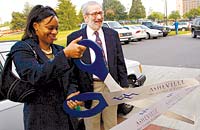Greener than a yellow taxi and a blue cab put together

To promote his new business, Robert Eidus offered to give Asheville Mayor Terry Bellamy a ride to work in a Mercedes-Benz station wagon on Aug. 2. The biodiesel-powered Benz is the first of a fleet of alternative vehicles that Green Transit hopes to put on the road. The transportation service plans to cover Buncombe and Madison counties.
As Bellamy emerged from the car outside the City Building, she was greeted by clicking cameras and a small cluster of onlookers. After cutting a ribbon to symbolically launch the project, the mayor expressed the hope that entrepreneurial projects like Green Transit would help Asheville become a model of sustainability.
“I was able to do some reading on the ride and discuss sustainability issues with my fellow car-poolers,” she told Xpress. If the business is successful, more Green Transit customers may spend their commute time catching up on the news, conversing or just enjoying not having to navigate rush-hour traffic. And of course, cars powered by biodiesel, compressed natural gas or electricity produce far less air pollution.
Here’s how it works: Before getting on board, passengers pay an annual fee ($15 for individuals, more for companies) to set up a subscription. “By having the subscription, that opens the door so you can use the service,” Eidus explains. Once enrolled, riders must call 24 hours in advance to book a trip. The cost will depend on the distance traveled and the number of passengers along for the ride, he says, adding that it “will be between the bus and the taxi.” Rather than collecting cash on board, Green Transit will send out monthly bills. The service could take you to the airport to catch a flight, spare you the responsibility of being the designated driver, or transport you to local attractions, says Eidus. Businesses can even use the system to send packages.
So far, the biodiesel station wagon is the business’s only vehicle, but Eidus hopes to add a van that runs on compressed natural gas and an electric-powered bus by early next year. “The natural-gas vans are a natural for Asheville,” he notes. “We have that [city-owned] pumping facility that is dirt cheap.”
Eidus expects rising gas prices, which will make single-passenger commuting in a standard automobile increasingly expensive, to help fuel the success of Green Transit. “I can’t express this enough,” he emphasizes. “Petroleum is not going down—it’s going up.” Meanwhile, says Eidus, technologies like compressed natural gas and biofuels “are going to keep going down and down and down.”
To book a ride with Green Transit, call 254-7676.
Asheville and Warren Wilson College team up to turn the heat down
Although the federal government has done little to tackle climate change, other organizations are picking up the slack. Programs like Cool Cities, an agreement signed by mayors across the country, demonstrate the broad support for ensuring a more livable future. Another program, the American College and University Presidents Climate Commitment, has gotten commitments from more than 300 U.S. colleges and universities to curb their emissions. The city of Asheville has signed on with Cool Cities, and Warren Wilson College is a partner in the campus program.
And at press time, Asheville and Warren Wilson were poised to announce a unique agreement to work together toward a common goal. “The agreement began with a conversation the mayor had in April with Warren Wilson College President Sandy Pfeiffer and Margot Flood, the head of the Environmental Leadership Center,” notes city spokesperson Laurie Saxton. From there, the idea evolved into a formal agreement to develop sustainability strategies in tandem, says Saxton. “We realized that we had sort of a common goal and a common concern.”
Warren Wilson has won a slew of environmental awards and received national recognition for its innovative green programs. For Asheville, gaining access to the expert guidance that drives the campus’ sustainability initiatives may result in a stronger comprehensive strategy for improving the city’s environmental performance. The Sustainability Advisory Committee on Energy and the Environment, a City Council committee, is charged with upholding the city’s end of the agreement.



Before you comment
The comments section is here to provide a platform for civil dialogue on the issues we face together as a local community. Xpress is committed to offering this platform for all voices, but when the tone of the discussion gets nasty or strays off topic, we believe many people choose not to participate. Xpress editors are determined to moderate comments to ensure a constructive interchange is maintained. All comments judged not to be in keeping with the spirit of civil discourse will be removed and repeat violators will be banned. See here for our terms of service. Thank you for being part of this effort to promote respectful discussion.